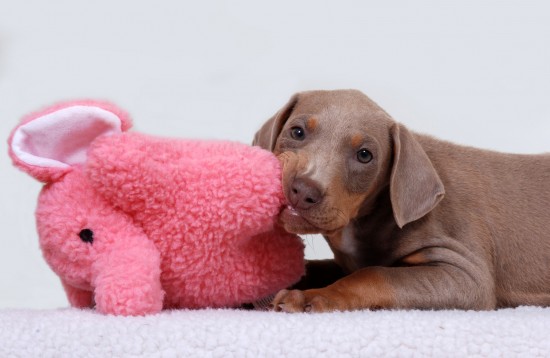

Puppies, are adorable little creatures bursting with life and energy that can also create a bit of lively havoc in the home. They are renowned for being naughty, mischievous and full of fun, wanting to play continuously and then passing out with exhaustion at the drop of hat. However, no matter how cute and adorable they are, puppies can be demons when it comes to chewing and nipping. Below is a guide to coping with a young dog's fascination with nibbling things and more especially the fascination they have of doing this with their own mouths!
Puppies just cannot help themselves, they adore chewing on things, and it's all part of important puppy behaviour. You may think they are just being a little bit naughty, but in truth they are discovering the world – and they do this with their mouths. So a nip or a nibble and a chew on your ankle, is in fact, your puppy testing the water and finding out about things they've never come across before. It's all part of a learning curve that puppies need to go through and then grow out of.
A puppy doesn't boast having great sensory abilities but they do have extremely strong senses of smell and taste which means everything they learn goes through their mouths. However, as they get older, this behaviour should slow down and eventually stop altogether – if it doesn't, you have got a naughty older puppy or young dog on your hands, and they need to be taught nicely how to behave, the need to be taught what is acceptable and what is not, and they need to be taught this gently but firmly.
It all starts when puppies are around eight weeks old, although this can vary from breed to breed. This is when puppies really like to get their teeth into things because it's when their permanent teeth start emerging in their mouths. It is really important to encourage young pups to chew on toys at this stage of their lives and every time they do, you have to reward them accordingly. Great toys for puppies include objects like “teething rings” and pacifiers. This is by far the best way to teach a puppy what they are allowed to chew on right from the word go.
However, you'll need to teach them using positive reinforcement techniques. It's no good just giving them a pacifier and thinking they will just chew on it because they won't - you need to teach them using the following tips:
If you start to implement these teething tips right from the very beginning, you are setting your puppy up for a lifetime of acceptable behaviour which means they will enjoy themselves a lot more because they know the rules. With this said, it is really important for the whole family to be involved in this part of a puppy's training because consistency is the key to success.
The whole process of teething is pretty uncomfortable for puppies to have to go through. Puppy teeth are sharp and they erupt through the gums causing a lot of discomfort, so it's only natural for a puppy to want to gnaw on something because it offers them some relief. This naturally means you should never tell them off for wanting to gnaw on something instead you should offer them some great toys to chew on.
It is really important to start gently handling a puppy's mouth from an early age. Not only will this mean you can see which teeth are pushing through and if their milk teeth are falling out, but it also means that later on in their lives, you can check their mouths without any issues. This is important because you may need to see if your dog is suffering from any sort of dental problem.
Puppies are gorgeous little canines, they're full of life and energy but they all have to go through that “teething” stage which can be a bit of a nightmare for everyone concerned. If you teach them to chew on teething rings or a pacifier right from the word go and always reward them profusely when they do, you will have “nipped” the problem in the bud and avoided them chewing on things they should not. However, dogs never really lose their instinct to chew on things which is perfectly natural – the bonus of giving older dogs good, safe things to gnaw on is it keeps their teeth in good condition and reduces the risks of dental problems.
Copyright © 2005-2016 Pet Information All Rights Reserved
Contact us: www162date@outlook.com